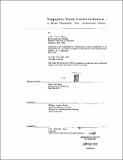| dc.contributor.advisor | William Lyman Porter. | en_US |
| dc.contributor.author | Lim, Chai Boon | en_US |
| dc.contributor.other | Massachusetts Institute of Technology. Dept. of Architecture. | en_US |
| dc.coverage.spatial | n-us-ma a-si--- | en_US |
| dc.date.accessioned | 2012-01-12T18:34:41Z | |
| dc.date.available | 2012-01-12T18:34:41Z | |
| dc.date.copyright | 1992 | en_US |
| dc.date.issued | 1992 | en_US |
| dc.identifier.uri | http://hdl.handle.net/1721.1/68265 | |
| dc.description | Thesis (M. Arch.)--Massachusetts Institute of Technology, Dept. of Architecture, 1992. | en_US |
| dc.description | Includes bibliographical references (p. 184-187). | en_US |
| dc.description.abstract | Today, with the prevailing global culture of modern technology and mass media, it is almost impossible to deal with the issue of cultural identity. Architecture, as such, has not only become a reflection of individuals, but its meanings are often diluted by the disillusioned designers. This is particularly apparent in countries undergoing intensive economic development. Singapore is just one of example of these industrializing nations. Singapore is a relatively young independent city-state with no known natural resources but its people and strategic geographic location. Its key to survival is to plug into the global market. Thus there is no escaping from the reality of global exposure. To keep up with the pace and challenge of today's economic forces, Singapore will have to shift her traditionally intermediary trade pOSition into a main role in the economic arena. To achieve this role, her existing port-city will have to gear-up to internationalize her economy, hence, the hypothetical proposal of a Singapore Trade Center in Boston. The imperative question is, how are we going to present the intrinsic qualities of Singapore in Boston, and at the same time deal with the issues of architectural identity in the present situation? This thesis will begin, firstly, with a discourse into architectural identity for Singapore, and secondly with an exploration into the critical relationship between the building and its context. The design of this trade center can be regarded as a conscious attempt to seek a physical experience pertinent to Singapore's culture in the western environment. The goal of this thesis is to raise the level of awareness in the field of architectural design, while not arriving at a conclusive solution. | en_US |
| dc.description.statementofresponsibility | by Lim, Chai Boon. | en_US |
| dc.format.extent | 188 p. | en_US |
| dc.language.iso | eng | en_US |
| dc.publisher | Massachusetts Institute of Technology | en_US |
| dc.rights | M.I.T. theses are protected by
copyright. They may be viewed from this source for any purpose, but
reproduction or distribution in any format is prohibited without written
permission. See provided URL for inquiries about permission. | en_US |
| dc.rights.uri | http://dspace.mit.edu/handle/1721.1/7582 | en_US |
| dc.subject | Architecture. | en_US |
| dc.title | Singapore trade center in Boston : a design exploration into architectural identity | en_US |
| dc.type | Thesis | en_US |
| dc.description.degree | M.Arch. | en_US |
| dc.contributor.department | Massachusetts Institute of Technology. Department of Architecture | |
| dc.identifier.oclc | 26696188 | en_US |
